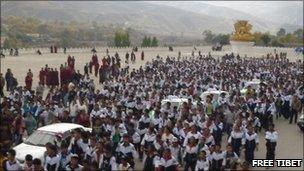More Tibetan students 'take to streets over reforms'
- Published

Protests by Tibetan students in China over the right to study in their language have spread, according to a rights group and state media.
Thousands marched in Qinghai province on Wednesday, following a peaceful demonstration in Tongren a day earlier.
It follows unconfirmed reports of plans to curb the use of the Tibetan language in classrooms in favour of Chinese.
Qinghai province is home to many ethnic Tibetans and was the scene of anti-Chinese riots in 2008.
Thousands of students, many of them in their early teens, are expressing their desire to continue to study and learn in their native Tibetan, said the London-based Free Tibet.
The campaign group said there were protests in Guolo, Qinghai province on Thursday. However the BBC could not confirm this.
About 2,000 students from four schools demonstrated in Chabcha town in Gonghe on Wednesday, shouting: "We want freedom for Tibetan language", Free Tibet said.
It also said middle school pupils protested in Xinghai but gave no details.
The Global Times newspaper reported that the protest by "students most wearing school uniforms" in Gonghe was peaceful.
"The social order restored quickly on the same day," an eyewitness was quoted as saying.
The authorities say that promoting Chinese in ethnic regions could help local people better integrate into the mainstream society.
But many Tibetans complain that their culture is being eroded, and say it is part of a campaign by China to increase its control over the remote Himalayan region.
China rules the Tibet Autonomous Region strictly but usually allows more freedom to Tibetan populations elsewhere in China; Tibetan is an official language in Tibet and parts of China such as Qinghai.
The Chinese government says it is bringing development and economic opportunities to areas long subject to official neglect.
- Published22 July 2010
- Published16 July 2010
- Published3 July 2010
- Published15 July 2010
- Published25 June 2010
- Published19 May 2010
- Published10 March 2010